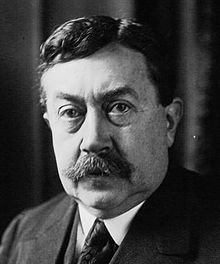Paul Painlevé
| Paul Painlevé | |
|---|---|

Paul Painlevé in 1923
|
|
| 62nd Prime Minister of France | |
|
In office 17 April 1925 – 28 November 1925 |
|
| President | Gaston Doumergue |
| Preceded by | Édouard Herriot |
| Succeeded by | Aristide Briand |
|
In office 12 September 1917 – 16 November 1917 |
|
| President | Raymond Poincaré |
| Preceded by | Alexandre Ribot |
| Succeeded by | Georges Clemenceau |
| Personal details | |
| Born | 5 December 1863 Paris |
| Died | 29 October 1933 (aged 69) Paris |
| Political party | PRS |
Paul Painlevé (French: [pɔl pɛ̃ləve]; 5 December 1863 – 29 October 1933) was a French mathematician and statesman. He served twice as Prime Minister of the Third Republic: 12 September – 13 November 1917 and 17 April – 22 November 1925. His entry into politics came in 1906 after a professorship at the Sorbonne that began in 1892.
His first term as prime minister lasted only nine weeks but dealt with weighty issues, such as the Russian Revolution, the American entry into the war, the failure of the Nivelle Offensive, quelling the French Army Mutinies and relations with the British. In the 1920s as Minister of War he was a key figure in building the Maginot Line. In his second term as prime minister he dealt with the outbreak of rebellion in Syria's Jabal Druze in July 1925 which had excited public and parliamentary anxiety over the general crisis of France's empire.
Painlevé was born in Paris.
Brought up within a family of skilled artisans (his father was a draughtsman) Painlevé showed early promise across the range of elementary studies and was initially attracted by either an engineering or political career. However, he finally entered the École Normale Supérieure in 1883 to study mathematics, receiving his doctorate in 1887 following a period of study at Göttingen, Germany with Felix Klein and Hermann Amandus Schwarz. Intending an academic career he became professor at Université de Lille, returning to Paris in 1892 to teach at the Sorbonne, École Polytechnique and later at the Collège de France and the École Normale Supérieure. He was elected a member of the Académie des Sciences in 1900.
...
Wikipedia
